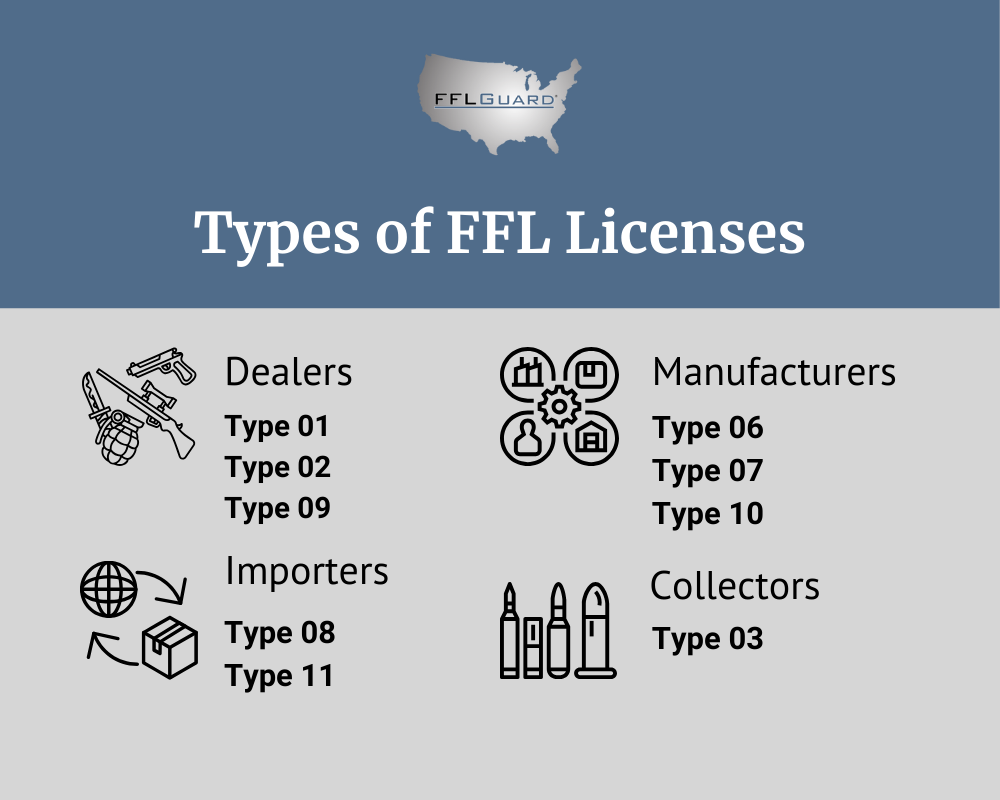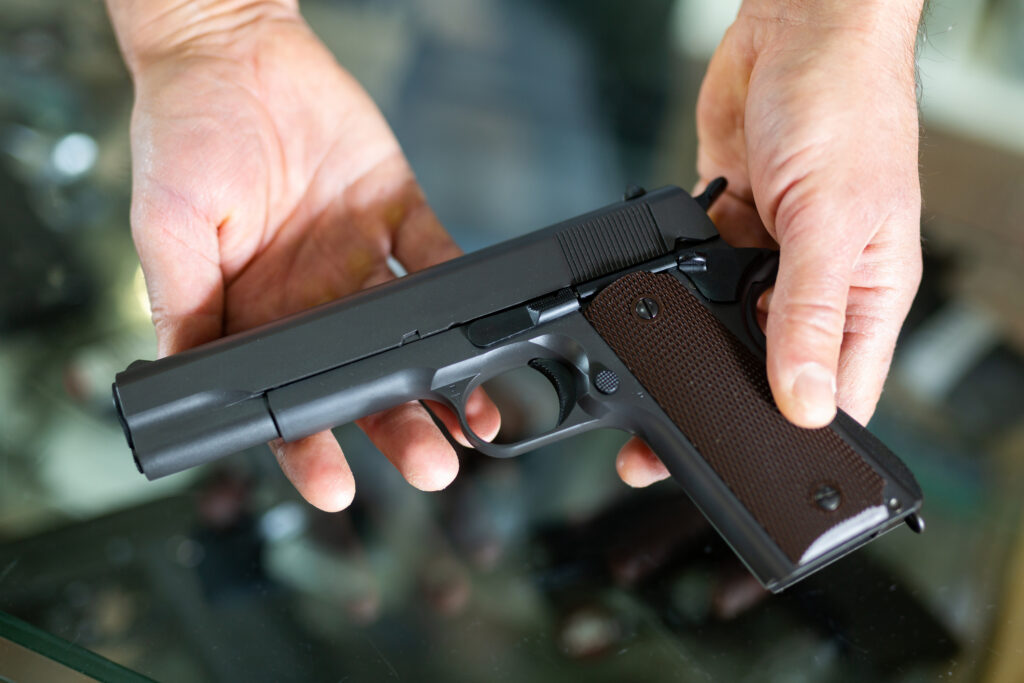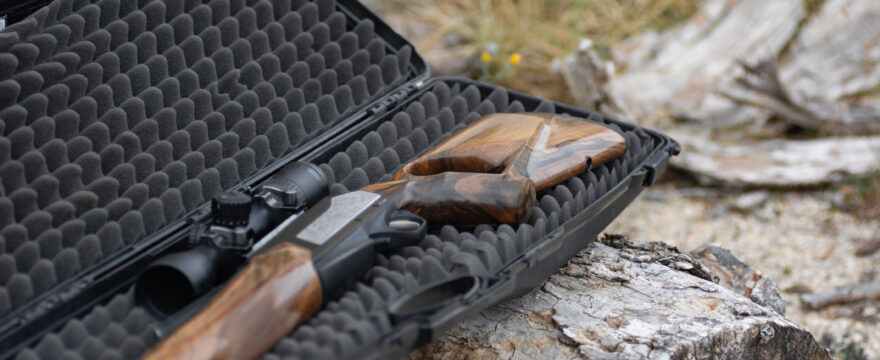Nine different types of Federal Firearm Licenses (FFLs) are issued by the Bureau of Alcohol, Tobacco, Firearms and Explosives (ATF) in the United States. Each one of these options allows a license holder to handle different aspects of the firearm trade. Some allow individuals or businesses to sell, import, and manufacture firearms and ammunition. Others are meant for collectors and rare arms dealers. These licenses can come with different application processes, costs, and additional certifications. At FFLGuard, our legal and subject matter experts specialize in firearms compliance solutions and are dedicated to helping FFLs navigate the firearms industry, no matter what type they have.
What is an FFL? What are the 9 Types of Licenses?
A Federal Firearm License is one of the most important certifications for any American interested in participating in firearm business transactions. This legal requirement regulated by the ATF ensures licensees across the industry can operate legally and in full compliance with state and federal regulations. Several types of FFL licenses are available targeting four different types of users- dealers, manufacturers, importers, and collectors.
- Type 01: Dealer
- Type 02: Pawnbroker
- Type 03: Collector
- Type 06: Manufacturer of Ammunition
- Type 07: Manufacturer of Firearms
- Type 08: Importer
- Type 09: Dealer of Destructive Devices
- Type 10: Manufacturer of Destructive Devices
- Type 11: Importer of Destructive Devices
FFLs for Dealers
- Type 01 FFLs can sell firearms at wholesale or retail, repair firearms, and fit special barrels, stocks, or trigger mechanisms.
- Type 02 FFLs can take or receive firearms as security for the payment or repayment of money in addition to activities permitted for a Type 01 FFL.
- Type 09 FFLs can sell firearms and destructive devices at wholesale or retail, repair firearms, and fit special barrels, stocks, or trigger mechanisms.
FFLs for Manufacturers
- Type 06 FFLs can manufacture ammunition for firearms.
- Type 07 FFLs can sell firearms at wholesale or retail and manufacture firearms and ammunition for firearms, as well as repair firearms, and conduct activities that include a change in form of a firearm.
- Type 10 FFLs can manufacture and sell destructive devices (with requisite SOT) along with firearms, ammunition for firearms, including destructive devices, and armor piercing ammunition.
FFLs for Importers
- Type 08 FFLs can import firearms and non-armor piercing ammunition and sell these items authorized to be imported at wholesale or retail.
- Type 11 FFLs can import destructive devices along with firearms and armor piercing ammunition and sell these items at wholesale or retail.
FFLs for Collectors
- Type 03 FFLS can acquire curios and relics in any state and sell, trade, or transfer these items to residents of the FFL’s state or out-of-state licensees.
Join the thousands of FFLs already protected by the FFLGuard Program.

What Do These Different FFLs Need for an Application?
All applicants will complete ATF Form 7, no matter what type of FFL they’re looking to apply for. Because of this, many of the requirements to apply for different kinds of FFLs will be very similar. However, there are a few factors that can be very different between the license types that potential FFLs should take note of when starting the application process.
Cost
One of the major differences between FFL types is the cost to acquire and maintain a license. Some FFLs offer the holder specific capabilities, such as the ability to handle destructive devices, that make the license fees significantly more expensive than some of the more basic options.
| FFL Type | Application Fee | Renewal Fee |
| Type 01 | $200 | $90 every three years |
| Type 02 | $200 | $90 every three years |
| Type 03 | $30 | $30 every three years |
| Type 06 | $30 | $30 every three years |
| Type 07 | $150 | $150 every three years |
| Type 08 | $150 | $150 every three years |
| Type 09 | $3,000 | $3,000 every three years |
| Type 10 | $3,000 | $3,000 every three years |
| Type 11 | $3,000 | $3,000 every three years |
SOTs and FELs
For some FFL types, the license alone will allow the holder to fulfill all its capabilities. There are additional licenses offered that allow FFLs to fill these functional gaps for similar functions can be requested and used along with an FFL. While these are not required for the primary license, an FFL holder might need to request one of these certifications to make full use of their license depending on the type they have.
Special Occupational Taxholder (SOT)
Once an FFL has been issued, the Special Occupational Taxpayer registration form can be completed. After the special (occupational) tax that applies to the business being conducted is paid, the SOT documentation will be sent in the mail within a few weeks. The three types of SOTs are Class 01, Class 02, and Class 03. Any SOT is valid from only from July 1 through June 30. NFA firearms may only be manufactured and/or transferred with ATF approval.
Class 01 SOT – Importer of NFA Firearms
An importer of firearms can pair their Type 08 or Type 11 FFL with the Class 01 SOT. This license is required to import items regulated by the National Firearms Act. The process for this SOT class costs $500 per year in registration (or up to $1000 depending on your yearly revenue). There are strict import requirements for NFA regulated firearms (including suppressors).
Class 02 SOT – Manufacturer of NFA Firearms
For FFLs, such as Type 07 and Type 10 FFLs, the Class 02 SOT allows licensees to deal and manufacture in NFA items, including short-barreled rifles and shotguns, suppressors, fully-automatic firearms with proper authorization, and destructive devices if appropriately licensed and authorized. All manufacturing must be reported and/or approved by the ATF. The tax costs between $500 and $1000 yearly, depending on the type and size of your business.
Class 03 SOT – Dealer of NFA Firearms
A Class 03 SOT allows dealers with Type 01, Type 02, or Type 09 FFLs to transact firearms regulated under the NFA. The tax, which costs $500 per year, allows holders to deal in items including short-barreled rifles and shotguns, suppressors, and fully-automatic firearms with proper authorization.
Federal Explosive License or Permit
Any business or individual that wishes to manufacture, import, or deal in explosives must pursue a Federal Explosive License (FEL) and/or Federal Explosives Permit. This license or permit, which ranges from $25/year to $200/year, requires an ATF Form 5400.13/5400.16. Similar to the Federal Firearms License application process, the Federal Explosive License Center will then coordinate with the ATF to conduct background checks, interviews, and inspections to determine if the license or permit may be issued.

How FFLGuard Protects You as an FFL or FEL/P
With so many different options, one of the hardest parts of getting an FFL or FEL/P is knowing where to start. Applying for an FFL or FEL/P is a relatively straightforward process for many, but some aspects of it require careful preparation, including the initial application form, background checks, and interviews. Knowing what you plan to do with your FFL or FEL/P will help you plan accordingly and set yourself up for a smooth process, even if your FFL or FEL/P requires some additional steps.
Since 2008, FFLGuard has been committed to providing expert guidance on ATF compliance and legal protection through our top-notch cooperative legal and compliance program. Our team includes firearms-specific counsel, subject matter experts, former ATF Industry Operations Investigators (IOIs), and former ATF Special Agents who provide unparalleled expertise in firearms compliance solutions for FFLs and FEL/Ps. Join us to get started with FFLGuard today.

